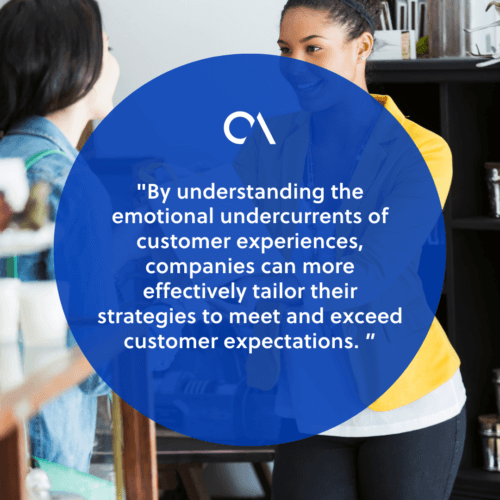Elevate customer experience: The power of emotional intelligence

This article is a submission by iCXeed. iCXeed is the only digital-first contact center outsourcer in the market that is disrupting the Business Process Outsourcing (BPO) industry by delivering fewer services but more value.
In an era where consumer expectations are higher than ever, the role of emotional intelligence (EI) in shaping customer experience cannot be overstated.
Emotional intelligence is crucial for meaningful customer interactions. It involves recognizing, understanding, and managing our own emotions, as well as those of others.
This guide delves into the importance of emotional intelligence in creating positive and memorable customer experiences.
It explores how leveraging EI can transform ordinary customer service encounters into opportunities for building lasting customer relationships and loyalty.
Emotional intelligence in customer experience
This section explores the intricate ways in which emotions affect customers’ perceptions of their interactions with businesses and how these perceptions can ultimately guide their purchasing decisions.
The influence of emotions on customer perceptions and decisions is profound and multifaceted. Research has consistently shown that customer emotions influence their behavior and choices, specifically:
- Perceptions of a brand
- Perceived value of products and services
- Decision-making processes
By understanding the emotional undercurrents of customer experiences, companies can more effectively tailor their strategies to meet and exceed customer expectations.
EI builds trust and rapport
Trust and rapport are the foundation of effective customer relationships, and emotional intelligence is the key to building these critical connections.
Strategies for establishing trust and rapport through emotional intelligence involve demonstrating empathy, active listening, and genuine concern for the customer’s needs and experiences.
Businesses can leverage emotional cues to create a welcoming and understanding environment for their customers. Sincerity and reliability are essential for fostering a sense of safety and trust among customers.
Through emotionally intelligent interactions, companies can cultivate deeper connections with their customers, leading to more meaningful and lasting relationships.
EI cultivates long-term customer relationships
The correlation between emotional intelligence and long-term customer relationships is undeniable.
Emotional intelligence facilitates a deeper understanding of customer needs, expectations, and emotions. It enables businesses to engage with their customers in more personalized and impactful ways.
Emotionally intelligent approaches to customer service can increase customer satisfaction, which in turn fosters loyalty and advocacy.
By prioritizing EI, businesses can transform one-time buyers into loyal customers, thereby securing a competitive advantage in the marketplace.
How to boost customer experience using emotional intelligence
Work on having strong emotional intelligence to elevate your overall customer experience. Focus on the following:
Empathy
Empathy, the ability to understand and share the feelings of another, stands as a foundational element of emotional intelligence, particularly within the context of customer service.
Businesses can cultivate an empathetic understanding of their customers’ experiences by using techniques such as:
- Putting oneself in the customer’s shoes
- Asking open-ended questions to encourage detailed responses
- Reflecting on customers’ feelings
These practices not only aid in understanding customer needs but also in building strong, emotionally connected relationships that enhance overall satisfaction.
Effective communication and active listening
Effective communication is a vital skill in delivering superior customer service. Clarity, conciseness, and positivity in verbal and non-verbal communication are essential for preventing misunderstandings and creating positive interactions.
Customize communication styles to match customer preferences and the situation at hand. By enhancing communication skills, customer service professionals can ensure that interactions are not only informative but also supportive and engaging.
Active listening, on the other hand, is a critical aspect of effective communication. It involves fully concentrating on, understanding, responding to, and remembering what the customer says.
Practice active listening methods to grasp customer emotions and concerns effectively:
- Maintain eye contact
- Use affirmative body language
- Provide feedback that confirms understanding of the customer’s point of view
Active listening allows customer service professionals to identify the underlying issues and emotions in customer communications, leading to more accurate and empathetic responses.
Mastering the art of active listening can help businesses significantly improve the quality of their customer interactions, which in turn will likely result in higher levels of customer satisfaction and loyalty.
Conflict resolution and de-escalation
Conflict resolution and the de-escalation of tense situations are critical components of customer service that benefit significantly from emotional intelligence.
Handle customer complaints with empathy, understanding, and emotional intelligence.
Approach conflicts calmly and use empathetic communication. By doing so, customer service professionals can create an environment where solutions are collaboratively sought and reached.

Incorporate these techniques to diffuse tension and work toward resolution:
- Active listening
- Expressing understanding
- Validate the customer’s emotions
Employing these strategies not only resolves the immediate issue but also demonstrates to the customer that their satisfaction and well-being are of paramount importance.
The effective management of conflicts is not just about resolving present issues but also strengthening customer loyalty. Successfully navigating through conflicts and complaints can result in enhanced customer trust and loyalty.
When customers see that a company is willing to listen, understand, and genuinely address their concerns, their emotional connection to the brand deepens.
Resolving conflicts with care and emotional intelligence transforms potentially negative experiences into opportunities for building stronger customer relationships.
Customers who feel heard and valued, even in challenging situations, are more likely to remain loyal and become advocates for the brand.
The role of emotional intelligence in leadership
Leaders who embody EI possess a unique ability to inspire, motivate, and positively influence their teams. Emotionally intelligent leaders create a supportive and motivating environment that encourages team members to achieve their full potential.
These leaders care for their team’s well-being and growth, and by being empathetic and understanding, they create loyalty and a sense of belonging among their staff.
They navigate and mitigate stressors within the team, thereby enhancing collective productivity and job satisfaction. The transformative impact of EI on team dynamics leads to more cohesive, resilient, and high-performing teams.
Emotional intelligence among leaders is a critical factor in organizational success. Leaders who prioritize emotional intelligence can:
- Effectively connect with their team members
- Anticipate and address their needs
- Resolve conflicts efficiently
Leadership development programs like training in empathy, active listening, and self-regulation can help create effective leaders in the future.
By championing emotional intelligence at the leadership level, organizations can create a more empathetic, understanding, and responsive management culture that benefits the entire workforce.
Vision for customer-centric emotional intelligence
The integration of emotional intelligence principles into customer experience strategies represents a forward-thinking approach to business. EI can be woven into the fabric of customer interactions to enhance satisfaction and loyalty.
AI and machine learning technologies can help recognize and respond to customer emotions in real-time alongside human-led initiatives.
The future vision for EI in customer experience is one where businesses not only respond to what customers say but also understand and anticipate their emotional needs, creating a more personalized and emotionally resonant experience.
Incorporating emotional intelligence into organizational values and culture is essential for creating a truly customer-centric business.
Companies must embed EI into their core values, ensuring that every employee, from the front-line staff to the executive team, understands and practices emotional intelligence in their interactions with customers and each other.

Emotional intelligence: A driving force behind excellent customer experience
The comprehensive exploration of EI within the context of customer experience is critical in shaping positive customer interactions, building loyalty, and fostering long-term relationships.
It helps organizations enhance team dynamics and leadership effectiveness to create a customer-centric culture that prioritizes empathy and understanding.
Commitment to emotional intelligence is not merely a strategy but a core value that can transform an organization’s fabric, leading to greater satisfaction for customers and employees alike.
Businesses and professionals must embrace emotional intelligence as a vital element of their customer experience strategy.
Organizations are encouraged to assess and enhance their emotional intelligence capabilities, from training staff and leaders in EI principles to integrating these practices into their daily operations.
A thoughtful approach to emotional intelligence includes ongoing commitment, learning, and adaptation. As customer expectations continue to evolve, the ability to connect with customers on an emotional level will increasingly become a differentiator.








 Independent
Independent




